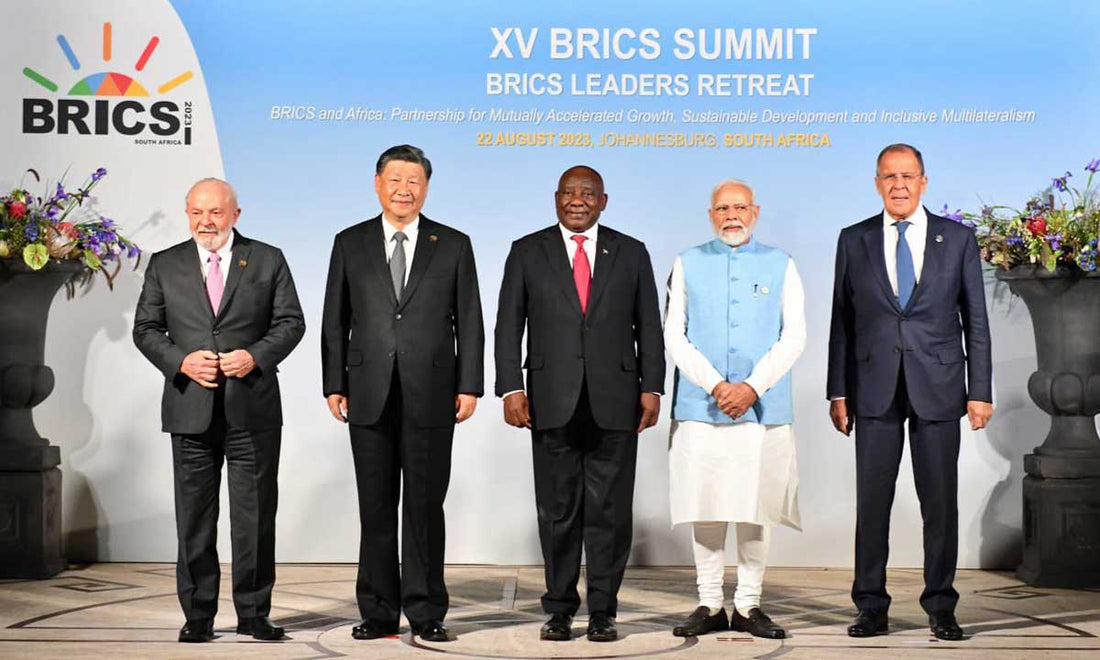BRICS Nations Convene, Seek Stronger Global South Voice
Omar HassanBRICS leaders meet in Brazil to strengthen Global South cooperation.

Leaders from the BRICS nations - Brazil, Russia, India, China, and South Africa, along with new members Egypt, Ethiopia, Indonesia, Iran, and the United Arab Emirates—are meeting in Rio de Janeiro, Brazil. The summit, chaired by Brazil, aims to strengthen cooperation among the Global South and promote a more inclusive and sustainable global governance.
Discussions are centered on increasing collaboration and addressing concerns over Western dominance in the global order. Despite the absence of key leaders like Russia's Vladimir Putin and China's Xi Jinping, the summit underscores the bloc's commitment to multilateralism and a more equitable world..
Highlights
- BRICS leaders are meeting in Rio de Janeiro to enhance cooperation among emerging economies.
- The summit's agenda includes global health, trade, AI governance, and climate change.
- Discussions aim to counter Western dominance and promote a multipolar world.
Read More: Xbox to be like Office: Everywhere, says Nadella
Top 5 Key Insights
• Global South Cooperation: Brazil's presidency emphasizes strengthening ties among developing nations to address shared challenges and opportunities. This focus aims to create a united front for advocating the interests of the Global South in international forums. Increased cooperation can lead to more effective solutions for issues like poverty, climate change, and access to technology.
• Multilateralism and International Law: BRICS nations reaffirm their commitment to the UN Charter and international law, advocating for a more equitable global order. This commitment signals a desire to reform the current international system to better reflect the interests of developing countries. By upholding multilateralism, BRICS seeks to promote peaceful resolution of conflicts and greater global stability.
• Economic and Financial Cooperation: Discussions include increasing IMF quotas and World Bank shareholding for emerging economies, aiming for greater financial inclusion. This push for reform highlights the need for developing countries to have a stronger voice in global financial institutions. Enhanced financial cooperation can lead to increased investment and sustainable development within BRICS nations.
• Focus on Key Global Issues: The summit addresses critical issues such as climate change, global health, and artificial intelligence, seeking inclusive and sustainable solutions. These discussions reflect the bloc's commitment to tackling pressing global challenges that disproportionately affect developing countries. By collaborating on these issues, BRICS aims to drive innovation and promote equitable access to resources and technologies.
• Trade and Economic Growth: BRICS nations are exploring ways to increase trade and economic cooperation among themselves, potentially creating new opportunities for growth. This focus on economic partnerships aims to reduce dependence on traditional Western markets and foster greater self-reliance. Increased trade and investment within BRICS can lead to job creation, economic diversification, and improved living standards.
Read More: Jessica Alba's Net Worth: Acting, Business & Real Estate
Expert Insights
Lucia Newman, Al Jazeera: "The BRICS goal is to exert pressure for a multipolar world with inclusive global governance to give a meaningful voice to the Global South, especially in the trading system."
Source quoted by The Associated Press: Some member states are calling for a firmer stance on Israel's war in Gaza and its recent strikes on Iran.
Read More: Beyoncé's Net Worth Rises, Driven by Tour
Wrap Up
The BRICS summit in Rio de Janeiro highlights the growing importance of emerging economies in shaping the global agenda. By focusing on cooperation, multilateralism, and addressing key global challenges, the BRICS nations aim to create a more equitable and sustainable world order.
The discussions and agreements made during the summit will likely have far-reaching implications for international relations and global governance, underscoring the need for inclusive and collaborative solutions to pressing global issues.
Read More: Chegg Cuts Staff, CEO Replaced Amid AI Disruption
Author
Omar Hassan - An experienced international affairs correspondent with a global perspective on major world events and diplomacy. He brings insightful commentary on global trends and international relations to Enlightnr.
More to Explore
- Choosing a selection results in a full page refresh.
- Opens in a new window.




